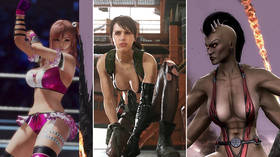In defense of the sexy: Scantily-clad videogame characters are a legitimate design choice, not ‘boner culture’

An experienced game animator says he regrets having defended a scantily-clad character design in one of the most iconic games of our time, reviving a bitter discussion. But he had nothing to regret in the first place.
Video game animator Jonathan Cooper, who had worked on Mass Effect and Assassin’s Creed among others, was responding to a now viral tweet thread about the character ‘Quiet’ from Konami’s 2015 blockbuster game Metal Gear Solid V: The Phantom Pain, a female superhuman sniper whose attire can best be summed up as skimpy.
I remember defending this design pre-release to a crying dev at GDC, (upset about her body image portrayal in games) with a "wait and see" and have felt awful about it ever since so never want to diminish her reaction again. https://t.co/jmgRiRvy8F
— Jonathan Cooper (@GameAnim) February 8, 2020
According to Mr. Cooper’s tweet, he defended the design of the character to a “crying game developer” with a wait and see approach, and now he feels awful about having done so. Aside from Cooper’s support, other Twitter users replied with similar bile towards the character design.
That's the horniest BS I have heard in some time.
— BadOpinionHaver (@Brgh4life) February 7, 2020
The designers actual reasons for these character designs are always:1. I am very horny.2. Shut up.
— Tanner Rasmussen (@Bruinraven) February 7, 2020
This is up there with the time Power Girl tearfully explained she has a boob window cut into her suit to symbolize her search for identity.
— Shaenon K. Garrity (@shaenongarrity) February 7, 2020
Quiet’s design has been called ‘sexist’ a myriad times since she was first revealed, and Cooper’s self-flagellation has revived a long trend of questioning the design choices behind sexy characters. Game journalist Jim Sterling, among others, threw a fit over project director Hideo Kojima’s decision, dismissing the reason for the design (a mutation caused her to breathe through her skin) as an excuse to see a scantily clad woman. Such claims were partially refuted by Kojima, stating that there was more to the decisions that he made about the character and that there was a deeper narrative that was expressed by her presence.
But the reaction of the anonymous developer mentioned in Cooper’s tweet can best be described as an overreaction – there are likely more things on planet Earth deserving of tears than a scantily-clad digital woman.
The issue with this particular criticism is twofold. The first is very simple. It comes across as a method of censorship. Whether it is a developer such as David Ellis of 343 Studios or a member of the press, continuing to revisit this topic and branding such designs as a mistake or as “boner culture” comes across as an attempt to shut down creative voices.
Sexuality and bare skin are, in and of themselves, not purely vapid. If anything, it can be used to drive a larger point home. The film Eyes Wide Shut by Stanley Kubrick uses eroticism and nudity at points to titillate, but also at points to illustrate horror at the possibility of infidelity or of being publicly exposed. In a previous Metal Gear Solid game, the character of Raiden is seen nude and said state is there to give a sense of vulnerability as one hides from incredibly well armed soldiers. Similar ideas are also used in Kojima’s recent title, Death Stranding, to convey a sense of vulnerability. You can likely find defenses of such decisions that are vapid, but those don’t discredit the artistic choice in the slightest.
The second issue is a willful ignorance of the ability for art to be more than just the assumptions of those in the press. This discredits the artist unfairly, attempting to delegitimize them as some sort of a smut peddler. Though some may not enjoy a character that is sexy or what have you, there’s a mistake embedded in the idea of simply dismissing it or lamenting its existence. To quote Jean de La Bruyere, “The pleasure of criticizing takes away from us the pleasure of being moved by some very fine things.” Simply looking at a character like Quiet and dismissing her simply as fanservice takes away from both the dimensions of the character and the complexities of the situation she is in. As part of the mercenary army led by the player character, fear of her superhuman abilities has her constantly monitored by armed men, and it takes time for said fear to subside. The ending to her arc can be quite touching as well, and all of those twists and turns are missed by those who simply dismiss it as smut, sexist, or something along those lines.
There are quite a few video games that include beautiful women, and some are purely meant to titillate. There are quite a few that aren’t. The assumption that a sexual situation in and of itself only having one purpose in an artful endeavor is an exercise in either ignorance or sophistry, depending on the person levying the criticism. If you purely judge the game Nier: Automata based on the attractive androids, you miss out on the exploration of existential thought inspired by thinkers such as Jean-Paul Sartre. Another example could be the now infamous review of Bayonetta 2, where Polygon writer Arthur Gies complained about a female character designed by a woman being sexual when that’s the entire point.
There are zero things to regret when it comes to defending a creator’s right to create how they choose, sexy or otherwise. If someone is so offended, they can always use their own right to choose to not partake in it.
The statements, views and opinions expressed in this column are solely those of the author and do not necessarily represent those of RT.
















